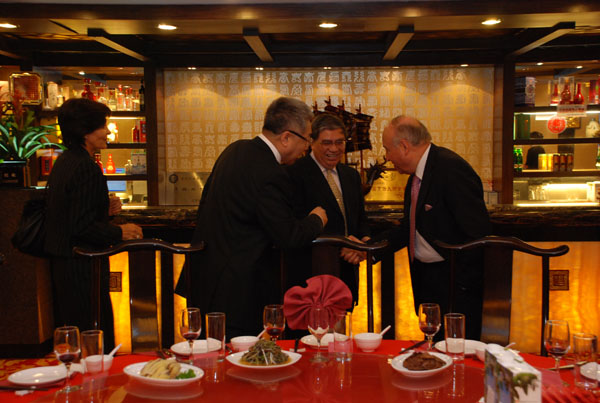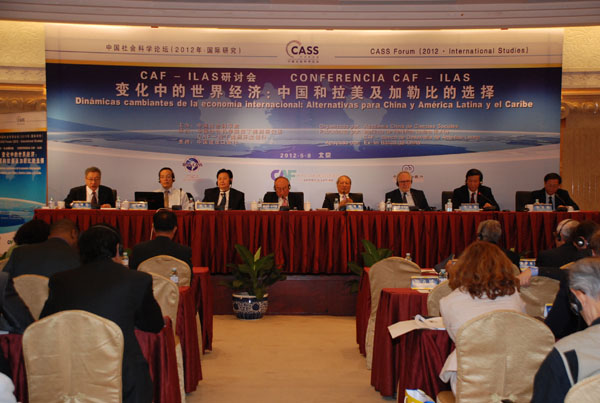
On May 8, 2012, CASS International Forum (2012 International Issues) was held
ceremoniously in Beijing News Plaza. As one of the academic brand of the Chinese Academy of Social Sciences(CASS) and the unique international annual forum for Latin America and Caribbean in China, the forum has been held continuously for eight times since 2005. The theme of this year’s forum is " World Economic Transformation: The Options for China & Latin America and the Caribbean ". It was co-sponsored by the Chinese Academy of Social Sciences (CASS),CAF-Andean Development Corporation (CAF) and the Institute of Latin American Studies of CASS (ILAS), the Export-Import Bank of China provided support to it. Officials from the Ministry of Foreign Affairs, the International Department of the CPC Central Committee, the National Development and Reform Commission and others state units; ambassadors of Latin America and the Caribbean countries to China and diplomatic officials, experts and scholars from renowned research institutes and universities, totally more than 200 people participated in the forum.
As an international publishing platform for academic achievements of Latin American studies for many years, the forum released three important pulications this year: First, the annual report: Latin American Economic Outlook 2012: Transforming the State for Development, (Chinese version) co-authored by the Development Centre of OECD and ECLAC of the United Nations; Second, economic and development report 2012: Financial Services for Development: Promoting Access in Latin America, (Chinese version) written by the CAF-Andean Development Corporation (CAF); Third, annual report 2012: Middle-Income Trap: a Case Studies from Latin America edited by Zheng Bingwen:. Moreover, it was also released Annual report on Latin America and the Caribbean (2011-2012) edited by Wu Baiyi.
Part 1
Maintain the vitality of economic growth and avoid the middle-income trap
Mr. Cheng Siwei (the vice-president of the Ninth and Tenth Standing Committee of the National People’s Congress of China, chairman of Sino-Latin American Friendship Association, renowned economist), Mr. Enrique Garcia (the Executive Chairman of CAF), Mr. Gao Quanli (the vice president of the CASS), Mr. Yu Hongjun (Vice Minister of Foreign Affairs and International Department of the CPC Central Committee), Mr. Liu Shijin (Deputy Director-General of the Development Research Center of State Council), Mr. Mario Pezzini (Director of the OECD Development Centre), Mr. Li Baorong (Sub-Director General of the Department of LAC Affairs of Ministry of Foreign Affairs of China) were invited to attend the opening ceremony of the forum and made a speech. Mr.Zheng BingWen (the director of ILAS) presided over the opening ceremony.
Mr. Cheng Siwei, said in his speech, China's economic and social development has made a leap in progress since the reform and opening up, especially the past 10 years, the economic strength has been greatly improved. In 2010, China's per capita GDP reached $ 4,277, stepping into the "middle income" countries in the world. How to avoid the "middle income trap" and maintain the sustained, healthy and stable development of China's economy, which is not only the need of fully realizing a well-off society in 2020 and forward to the ranks of high-income countries, but also the guarantee that China can continue to make contribution for world economic development. In this process, the internal and external conditions that needed to achieve the above objectives will face with more difficult and complex factors, especially in the context of post-crisis era that the uncertainty of global economic trends increasing. In his view, about how to go out of the "middle income trap", the experience of the developed countries is worth using for reference. Early industrialized countries such as Britain and others; or late rise countries such as Japan and South Korea, etc. they avoid falling into the "middle income trap" in different ways. It is very important to learn their successful experience for current China. In this context, it needs the think tanks in China and Latin America countries cooperate with international organizations closely and offer advice and suggestions for China's sustained and healthy development.
Mr. Gao Quanli, on behalf of the host, the Chinese Academy of Social Sciences (CASS), made a speech. He said, the current world economy is still unstable. The risk of debt crisis in Europe has not completely disappeared, the policy adjustment of the euro-zone countries is still facing great challenges, and the process is not smooth and its impact on global economy is still need to be observed; the U.S. economy has shown the sign of recovery, however its strength and sustainability still need to be concerned about; At present, in the unstable global economic situation, whether the economic growth dynamic showed by China and Latin America and the Caribbean region so far can continue to maintain and become the positive factor to promote the growth of world economy, is still in uncertainty which needs further study. He said that it is important to take full advantage of this platform for cooperation and communication, to collect wisdom and minds, to offer the suggestions for the development of China and Latin America and the Caribbean countries in the future.
Mr. Liu Shijin (Deputy director of the State Council Development Research Center, the famous economist) made a speech on the "middle income trap”. In his view, the possibility of China’s falling into the "middle income trap” that experienced by Latin American countries is very small, based on comprehensive international comparisons and theoretical derivation. The real challenge China facing is how to cross the "wall" of high-income, and step into the rank of high-income countries. He pointed out that in order to the cross the "wall", several important problems should be resolved: first, the country can effectively prevent and dissolve financial risk that accumulated in the period of rapid growth when the growth rate decline; second, enterprises can adapt to a lower growth rate environment and gradually change the profit model of “speed driving efficiency”; third, the government can adjust the macroeconomic objectives corresponding to the declining growth rate; fourth, comprehensive and effective market environment should be established to produce several innovative enterprises and a large number of innovative SMEs on a competitive basis, to cultivate the technology with long-term international competitiveness and knowledge-intensive manufacturing and service industries; fifth, the country can further open the markets, relax the monopoly industries, especially access restrictions in service industries, to provide space and dynamic for the development of service industry; sixth, migrants from rural areas can really turn into the city residents on the basis of balancing urban and rural development, and allocate farmers' contracted land optimally with the premise of protecting the interests of farmer; seventh, the universities and research system can be advanced through reform and can adapt to the need of constructing the innovative society; eighth, whether the size of middle-income groups could be enlarged through the promotion of institutional reform of employment, entrepreneurship, and income distribution; ninth, the modern financial system can adapt to the need of new stage of development and innovation, sharing and preventing the risk effectively; tenth,the government can transfer from growth-oriented to public service-oriented. About the problems in the process of economic transformation, he believes that China is facing two big challenges: one is the risk control and China should pay attention to the risk prevention than ever before, especially to the implied risks at the period of rapid growth, preventing the risk caused by the decline of growht in short-time and the investment risk caused by increased uncertainty after a high-speed growth period; another is dynamic transformation, and transferring from low cost factor oriented model into innovation and industrial upgrading oriented one. He pointed out, the asset bubble and large monopoly enterprises that government supported are the main threat to transfer to the innovation-driven model, and it is important to balance the relationship between the virtual economy and the real economy, large monopoly state-owned enterprises and private enterprises, especially small businesses on resources allocation, to cultivate a group of leading private enterprises that will play an important role in the industry upgrading.
Mr. Enrique Garcia talked in his speech about development of the CAF-Andean Development Corporation whose scale and influence has expanded since it established. Member in this organization has risen from 5 countries originally to 18 countries currently, including those in Latin America and the Caribbean and Europe. The organization contributed to narrow the gap between Latin American and Caribbean countries with developed economies, to promote the social justice and equitable development. He said that the studies on "middle-income trap “and its performance in Latin America by Chinese researchers have a positive infulence for Latin American countries. In the past, though this problem exists, the Latin American countries have ignored this study and lacked understanding of this issue. If Latin American and Caribbean countries want to get out of the "middle income trap" successfully, they should maintain sustained economic growth and carry out deep structural reforms in fields of education, infrastructure, and finance accessibility, etc., and introduce more constructive policies. Not only they should focus on economic growth, but also pay attention to the quality and efficiency of economic growth, and balance environmental protection and social equity to realize inclusive growth and promote economic and social development comprehensively and coordinately. He said, in current situation of world economy, it is important to establish an economic and strategic relations between Latin America and Caribbean countries and Asian countries, particularly with China. China has a lot of successful experience in promoting economic development and social equity; it is worth to learn for Latin America and Caribbean countries. He hoped that the Latin American and Caribbean countries to take the historic opportunity that the rapid development of the world's emerging economies, to make their own contributions together with China for promoting development of world economy; and it is also important for cooperation among developing countries.
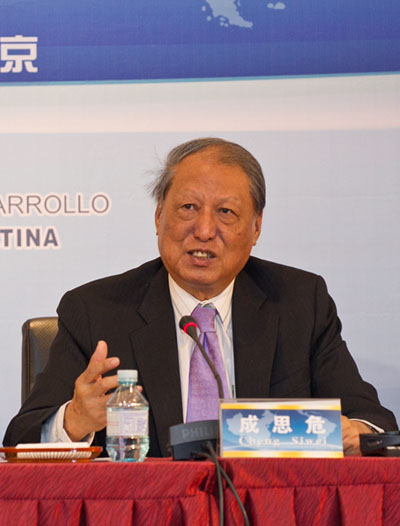
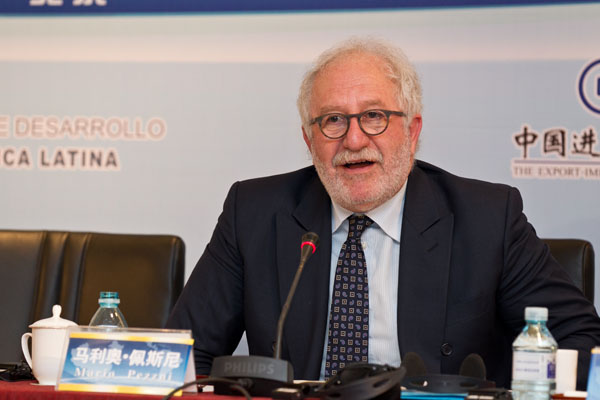
Mr. Mario Pezzini pointed out that all emerging economies in the world today have a higher growth rates. Although contributing to the rapid development of world economy, they face the issue on how to improve the national income, technological innovation, maintain a higher competitiveness and avoid falling into the "middle income trap". That is the most important issue currently. He believes that "middle income trap" was exposed to many countries, particular to the Latin American countries. It is a typical phenomenon of failed growth. There are two reasons: one is the failure of structural reforms; another is public sector has not been able to take sustained measures to economic growth. He also noted that Latin American and Caribbean countries and China have excellent performance in response to the economic crisis in 2008, thanking to good domestic macroeconomic policy and trade policy. He hoped that China and Latin America and the Caribbean countries should strengthen exchange and share experiences in productive development, innovative policy making, social equity promotion and public infrastructure development, etc.
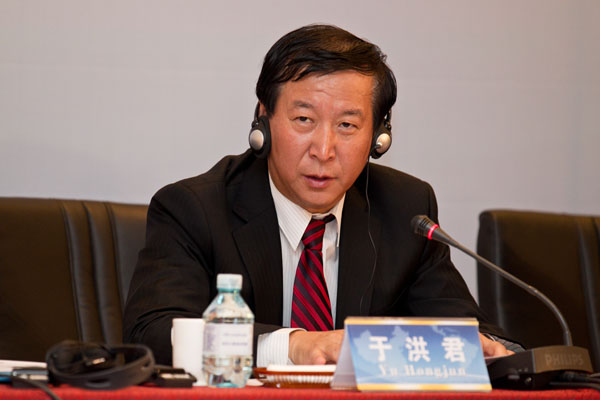
Mr. Yu Hongjun in his speech said that China made a great achievement of sustained and rapid economic growth through the reform and opening up in the past 30 years. It steps into the rank of "middle income" countries in the world. The next challenge China facing is how to overcome the "middle income trap", and develop from middle level to high level. This is a complex process, involving economic, political, social and other aspects. He pointed out that: as developing countries, China and Latin American countries have parallels in many way, and they have some commonality of history, such as the transformation of economic growth mode, the transformation of governance mode, the upgrading of industrial structure, the balance of regional development and co-ordination. Even though Latin America and the Caribbean countries are far away from China, they share common development opportunities. He hoped that the think tanks both in China and Latin American and Caribbean countries should strengthen academic research and communication, and share experiences of research and academic innovation, so that to explore an effective way for the future development.
Mr. Li Baorong's speech focused on recent progress made by China and Latin America and the Caribbean countries for development of relations between each other. There are mainly four areas: first, the exchange visit of senior leaderships for both sides is strengthened; second, the pragmatic cooperation of both sides is expanded; third, both sides have better communication and coordination in international affairs to safeguard the interests of developing countries jointly; Fourth, non-governmental exchanges have achieved fruitful results and the friendship between the people of both sides is enhanced.
Part 2
World Economic Transformation: the Characteristics and Challenges
The forum is divided into four units; the theme of the first unit is World Economic Transformation: the Characteristics and Challenges. Mr. Osvaldo Rosales (Director of International Trade and Integration Division of ECLAC) presided over the unit. Mr. Guillermo Perry (Consultant of CAF, Former Minister of Finance of Colombia, Former Chief Economist of the World Bank responsible for Latin America issues), Mr. Zhang Yansheng (Secretary-general of the Institute for International Economics Research of the National Development and Reform Commission, Former Director of the Institute for International Economics), Mrs. Alicia Garcia Herrero (Chief Economist of the Department of Emerging Markets, BBVA), had a deeply discussion on the issue about the challenges faced by the emerging countries under the background of economic globalization and China's economic transformation. Mr. Wang Jianye (the chief economist of the Export-Import Bank of China) made a summary of the speeches.
Mr. Guillermo Perry’s speech focused on the impact of China and India’s economic growth on Latin America and the Caribbean countries. He believed that China and India's rapid economic growth in recent years, is not only an opportunity but also a challenge for Latin American and Caribbean countries. They played a significant role in boosting the national economy in Latin America and the Caribbean and bring severe shocks and competition pressure on certain industries and sectors in these countries at the same time. He made a systematic analysis on several aspects that included the externality of demand, the opportunities of trade between China and Latin America, the contribution rate to the global GDP, the earnings of net export and loss of export manufacturing, the threat of competition on third markets, as well as comparison of U.S. exports of services. He concluded that the economic complementarity is greater than competitiveness between them. Latin American and Caribbean countries should make efforts to promote bilateral trade development, increase foreign direct investment and trade with China and India by signing trade and investment agreements. He suggested that Latin Amercian countries should transfer the comparative advantages from natural resource fields to scientific and technological knowledge fields by improving natural resource management policies, promoting industrial chain extension, and improving the quality of infrastructure and national knowledge and skill level, so that goods and services trade will have more high-tech contents. In addition, they should pay attention to resist trade protectionism, and trade policy should be in favor of domestic consumers; the governments should help the industrial sectors that have a negative effect to restructure.
Mr. Zhang Yansheng, pointed out in his speech that the global economic uncertainty is increasing, in the situation of lack of demand, confidence and methods for recovery. People focus on whether the United States and Europe will enter a Japanese-style quantitative easing mode. How the world economy will be affected by loose monetary environment, makes people full of confusion about the prospects. Nevertheless, he believes that China's economic restructuring is still at an important period of strategic opportunities. In order to avoid the “middle-income trap”, China needs to achieve the following aspects of the transformation: from export-oriented development model to a mode that expands domestic demand and mutual development with internationalization economic strategy; from unbalanced strategy to achieve common prosperity, coordinated development between eastern, middle and western regions and coordination of economic, social and ecological environment change, which means that the transformation from efficiency improving mode in the past 30 years shift to the equilibrium model; the functions of government should be transferred from the economic construction to public services. To realize social fairness and justice, government should further develop the market economy by decentralization, interest concession, tax reduction, and administration reform; transfer from the mode of ”crossing the river by feeling the stones" to one that are based on law and rules; from disorderly price competition to achieve orderly differentiation competition. Chinese companies should be upgraded, with additional product value at the ends of product chains, further improve the R&D, value-added areas of service, integrated logistics, and after-sale service to increase the core competitiveness of enterprises.
Mrs. Alicia Garcia Herrero in her speech said that more an more people recognize emerging economies are becoming the source of world economic stability, witnessd by the outstanding performance of emerging economies during the financial crisis that plagued the developed economies. It is expected that the contribution to global economic growth by emerging economies in Asia will increase to 58% or so in the next 10 years, in which China will account for more than 30%; At the same time, China’s impact on other emerging economies will be further strengthened, and China will become the major source of global investment,. In addition, the advance of urbanization in China means that the demand for raw materials will continue to expand. The role of middle-class consumer in emerging economies will stimulate the demand in the world gradually. In recent years, the diversification export in Latin American and Caribbean countries is presented with a declining curve, and the exports are highly concentrated, with increased dependence on China; China will become the largest trading partner in Latin America and the Caribbean. However, the highly concentrated export is not conducive to economic development in Latin America and the Caribbean. Therefore, export diversification is the choice for countries in the region currently.
Mr. Wang Jianye commented on this unit, he said that trade protectionism has risen in some Latin American countries due to the changing economic environment; especially those have competition with China in the third market. As a result, it will harm the interests of both sides. In fact, as factor costs of production continue to raise, the traditional comparative advantage of China drops continuously. China’s industry is facing the pressure of upgrading its structure. It will be a historical opportunity for Latin American and Caribbean countries. From the perspective of the past practice and the future development, the opportunities for bilateral economic and trade cooperation are far important than the challenges. It is optimistic for win-win beneficial relationship.
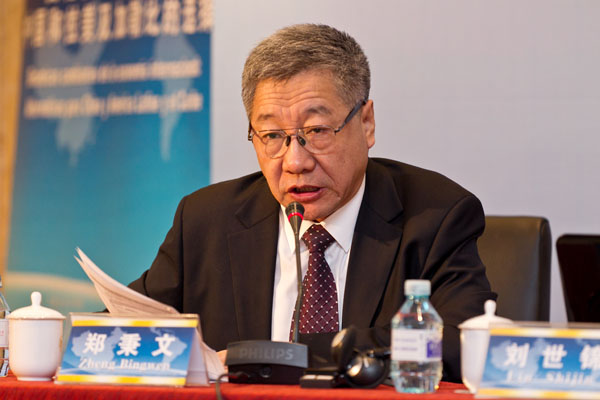
Part 3
The theme of second unit is: Access of Financial Services for Development in Latin America. Mrs. Chai Yu (Assistant Director-General of ILAS) presided over the unit. Mr. Daniel Ortega (Researcher of CAF-Andean Development Corporation), Mr. Zhang Jianhua (Director-General of the Research Bureau of the People’s Bank of China), Mrs. Liliana Rojas-Suarez (Researcher of Global Development Center, Former Chief Economist of Deutsche Bank on LAC issues), Mr. Zhou Dewen (Vice-Chairman of China Association of Small and Medium Enterprises), Mr. Osvaldo Rosales (Director of Trade and Integration Division, ECLAC), had a discussion and made speeches on the issues of financial accessibility for SMEs and the improvement of primary financial services and financial accessibility respectively.
Mr. Daniel Ortega introduced the achievements made by CAF-Andean Development Corporation in promotion of financial accessibility of Latin American and Caribbean countries. He noted that their service level is still low relatively, there are still have some problems such as high operating costs, inflexibility, lack of high technology, the difficulty in identifying the qualification of lenders and so on. The survey on financial access of Latin America and the Caribbean countries show that the accessibility of financial services for family and micro-enterprise in the region is still low. The "micro-financial model" launched by CAF is designed to provide financial services to low-income families and small businesses. The aim of it is to increase the income and consumption levels of the region's low-income families and improve education and health care through flexible measures and feasible exploration, thereby to increase the overall level of benefits for the families of the region, and to promote the development of small and medium-sized enterprises, so that more low-income families and small businesses can benefit from it.
Mr. Zhang Jianhua said in his speech that the financial service for China’s large and medium-sized cities is relatively accessible after years of reform and development, since those cities can meet the financial needs of businesses and individuals. At the same time, there are still have the phenomena that rural and small urban communities lack of financial services relatively. In recent years, the government achieved some success in improving financial services for rural and small micro-enterprise by introduced a number of policy measures. But lack of financial services is still a prominent problem in many areas. There are many reasons for it, but the key issue is that a primary competitive financial services system is not established. At present, the competition of primary financial institution is not sufficient and pricing power is controlled by the supply side, resulting a greater risk and inadequte supply at the same time; meanwhile, due to lack of adequate rights to choose, the customer can only passively received higher prices or poor financial services. He pointed out that in order to promote the competition of China's financial system and improve primary financial services, the following measure should be adapted: First, expanding the market access to improve primary financial services. To broaden the channels, so private capital can enter into the financial sector gradually and release the access of financial sector, particularly for the community-based small and medium-sized financial institutions; establish more small financial institutions for small and micro enterprises, and diversify rural financial institutions and form a moderately competitive rural financial pattern; second, to improve the mechanism of prevention and deal with the rural financial risks. The characteristics of bank’s externality caused the interests of depositors may be impaired when the banks have risks. So, it should accelerate to establish the deposit insurance system and protect the interests of depositors effectively, and prevent that the failures of several small and medium-sized bank may lead to systemic risk. The deposit insurance system is both an important means of risk prevention and a guarantee of the operation of market exit mechanism for those financial institutions with risks; third, to handle the relationship between the regulation, financial services and development of real economy correctly. According to the requirements of China's national financial work conference, financial support is fundamental for development of the real economy. The govrnment should improve the capacity and quality of financial services by adjusting the financial supply and layout to adapt the needs of the real economy. The rapid development of financial services industry may bring new challenges for financial supervision and regulatory, so the regulatory authorities need to improve and strengthen supervision continuously to adapt to the needs of financial business development, and make supervision adapt to the expanded supply of financial services and rational distribution of it.
Mrs. Liliana Rojas-Suarez’s speech is about the obstacles of Latin America's financial inclusion. She believes that the importance of financial inclusion in Latin America should be reflected in the following aspects: first, variety of financial services used by family and businesses. It can make inter-temporal consumption and increase the income and welfare distribution of resources; second, financial instruments that allow businesses and households to get the financial protection against the potential impact from different shocks (such as unemployment, natural disasters, disease, etc.); third, financial instruments can be used as an intermediary so that customers have the ability to raise savings and investment. Thereby they can provide more education and training opportunities for young people who need to work in the future; fourth, resources flow to good investment opportunity caused by the discrimination against the financial system in underdeveloped areas. Finally, she concluded that the main obstacle of the Latin America financial inclusion is mainly caused by four factors: macro-economic, society, institution and effectiveness and efficiency of the financial sector.
Mr. Zhou Dewen introduced the development of financial reform and private economy in Wenzhou city in his speech. The State Council of China decided to introduce a finance comprehensive reform pilot site in Wenzhou city on March 28, 2012, with the purpose to solve the outstanding problems of economic development in Wenzhou, to guide the private finance and regulate their development correctly, and to improve the financial ability service for real economy, which is important for exploration of the financial reform nationwide and the overall progress of China's financial reform in the future.
Mr. Osvaldo Rosales said in his speech: the analysis of the contribution rate of developing countries for world trade growth show that trade between developing countries will significantly increase, which is expected to be more than the those between the developed economies in 2017. In 2010, the developing countries absorbed 50% of global foreign direct investment. The gap of per capita income between developing countries and developed countries was narrowed by the economic crisis. At present, the center of the world economy is gradually moving to the emerging economies. China has become a new power in world economic growth. It is expected that two-thirds of the global middle class will come from East Asian countries in 2030, which accounted for more than 60% of global consumption spending. Emerging economies in Asia and Latin America and the Caribbean will lead the growth of world economy in the next eight years. China will become the most important trading partner of Latin America and the Caribbean countries. At present, China is supposed to replace the EU with the position of the second largest trading partner of Latin America, but economic and trade relation between China and Latin American and Caribbean countries is still facing challenges. For Latin American and Caribbean countries, they should strengthen multilateral initiatives in cooperation with Asian and Pacific countries, improve coordination within the Latin American and Caribbean countries, and maintain consistency in identifying of regional priorities. For China, the direct investment in Latin America and the Caribbean countries need to increase diversity continuously. It should strengthen the understanding of national policies and institutions of Latin America and the Caribbean, such as laws and regulations of labor and environment. It is important to provide financial support for small and medium enterprises that export to the Latin American and Caribbean countries. On this basis, both sides should strengthen dialogue mechanism of trade and improve the transparency of sanitary and phyto-sanitary agreement, and non-tariff measures should comply with WTO rules and commercial disputes should be resolved through negotiation and mediation or arbitration mechanism, thus trade and investment levels of both sides could be improved.
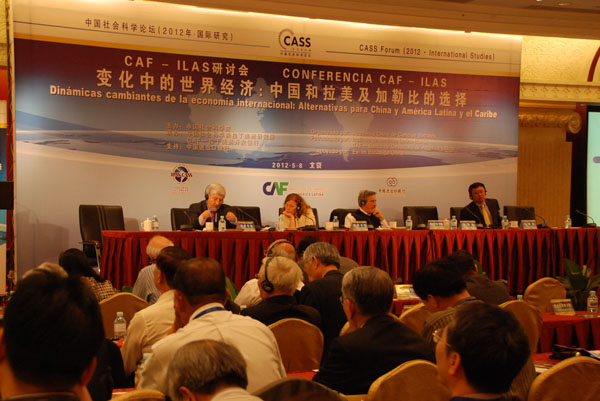
Part 4
The theme of the third unit is the "middle-income trap: the challenges of industrial transformation. This unit was hosted by Mr. Mario Pezzini (Director of the OECD Development Centre). Mr. Pablo Sanguinetti (Research Director of Socioeconomics Investigations, CAF), Mr. Zhang Ping (Deputy Director-General of Institute of Economics, CASS), Dr. Xie Wenze (assistant researcher of ILAS, CASS), Dr. Zhang Yong (assistant researcher of ILAS, CASS), who made a speech respectively. Dr. Tang Jun (Deputy Director of Institute of Latin American Studies, Zhejiang International Studies University) had a comment on the unit.
Mr.Pablo Sanguinetti analyzed the cause of "middle income trap" of Latin America and the Caribbean countries in his speech. He believes that the reason why countries in the region still trapped in the "middle income trap" is mainly caused by the failure of the structural reform. According to the traditional theory of economic growth that the underdeveloped countries can adopt the mature and advanced technology to catch up with developed economies and use of the advantage of backwardness to narrow the gap, but Latin American countries did not achieve this process, mainly due to their own weaknesses in the process of economic structural change. Other reasons include unequal distribution of income, unreasonable tax system, ineffective support of public sector for economic development; low productivity of service sector and low quality of employees; declining competitiveness of state-owned enterprises due to the over-protection by state; huge loss of revenue cause by the existence of a large number of underground economies. In the future, the Latin American countries need to develop a reasonable trade policy in the process of economic restructuring, to promote productivity increased by innovative policy, encourage the development of small and medium-sized enterprises and create more employment opportunities.
Mr. Zhang Ping’s speech mainly talked about that promotion of economic restructuring by improving the efficiency continuously. He made an empirical analysis of the evolution of industrial structure and efficiency of allocation through international comparison of economic structure evolution. He believes that a high growth of the country's economy should match the increasing labor productivity, otherwise that will not be sustainable. The scale improvement of service industry lags behind the manufacturing, and that will lead to structural deceleration. According to Kuznets’ law and Engel's Law, the evolution of industrial structure is caused by the demands and the improving labor productivity, and the positive evolution of industrial structure is promoted by employment gradually transfer to the high-efficiency sectors. If the employment is subject to some block or even transfer to the low efficient departments, the evolution of industrial structure will be negative. The historical experience of developed countries has shown that the evolution of industrial structure should be in line with the principle of labor efficiency, but it often appeared a tendency that the employment transferred to low-efficiency sectors in undeveloped countries, which lead to negative evolution of industrial structure. The current industrial evolution of China has reached a critical period. China is facing some serious challenges, such as regulatory problems of the modern service industry, decreasing employment in manufacturing, more retention caused by agricultural subsidies, and employment surge in public sectors. From analysis of the economic development experience of developed and developing countries and comparison of transformation and upgrading of domestic developed city, it can be concluded with the following arguments: First, to understand clearly about the cause of economic growth deceleration. The mechanism of industrial transformation and upgrading should be adjusted through market-oriented reform rather than back to the old policy of industrial intervention; second, the core objectives of the industrial transformation and development should focus on improvement of efficiency continuously in order to promote the level of trade in services and expand the market nationwide and globally. The proportion of the modern service industry should be enhanced and the service scale should be enlarged by improving the efficiency; third, it is important to maintain the advantage of the manufacturing sector. The country should focus on expanding its human capital and technological innovation capability, curb the rising house prices, seize the opportunities of development of global green innovative technology and innovation through government’s guidance; fourth, the goal of "promoting transformation and upgrading by improving efficiency continuously" should be achieved through finance, taxation and other measures.
Dr. Xie Wenze analyzed the cause of the "middle income trap" mainly from the view of industrial structure. He believes that there are two reasons for Latin America's prosperity of primary products exports and why they lagged behind the industrial prosperity of the United States: first, the technical factors: the Latin American countries did not seize the opportunity of the second “industrial revolution"; second, institutional factors: the choice of growth model was the endogenous institutional factors that restrict the industrialization of Latin American countries. Latin America's import-substitution industrialization lagged behind Japan's export-oriented industrialization. The main factors caused this phenomenon include: the Latin American countries have not yet completed the industrialization; low contribution of secondary industry to GDP growth rate; the mode of economic growth was extensive pattern. Both China and Latin American countries are facing opportunities and challenges in the process of economic restructuring and development. China should promote the process of modern industrialization and avoid developing the service industries prematurely or excessively, while Latin American countries should strive to develop agriculture, manufacturing and infrastructure.
Dr. Zhang Yong believed that the endogenous defects of import substitution and transformation failure led to the “middle-income trap" in Latin American. The mid-1960s to the 1980s was an important period that the Latin American countries had gradually broadened the economic development gap with East Asian countries, it is not only related to the endogenous defects of import substitution industrialization model, which implemented by Latin American countries in early phase, but also associated with the historic delay in transformation of this model. As a development model, import substitution industrialization has obvious limitations. In general, this model run relatively smoothly in the initial stage of industrialization, but a variety of structural imbalances emerged over time gradually. The longer time the model continued, the structural imbalance will be aggravted, even leading to structural development crisis. It is still possible for small country in Latin America can rely on a single economic structure development, but the large countries of Latin American need to have a strong industrial system and manufacturing with international competitiveness, which is one of the necessary conditions for sustainable development. The history of Latin American modernization shows that the transformation of economic development mode was always negatively pushed by an exogenous or endogenous economic crisis. Primary products export model lasted for 60 years and import-substitution industrialization model in Latin America had been carried on for 50 years. Latin America plunged into of the "middle income trap" for long time, and the historic delay of transformation in the last two times was one of the root causes of it. Developing countries should pay attention to these lessons. When the dynamic of an economic growth model exhausted, there often have a signal of structural imbalance, then it should change the growth mode timely rather than make hard adjustment of recession until the crisis break out; otherwise, it will pay higher economic and social costs.
Dr. Tang Jun commented this unit. He believes that "middle income trap" seems like figures of per capita GDP growth, and in fact, that is the problem on growth and development. We need to treat it systematically, comprehensively and progressively. In future, economic and social development factors, such as the government management, social security, livelihood improvement and other aspects, are all issues to be considered h by China and Latin America and the Caribbean countries.
Part 5
The theme of fourth unit is “State Transformation for Development”. Mr.German Rios (Advisor to the Executive President of CAF) presided over the unit. Mr. Christian Daude (Head of Americas Desk of OECD Development Centre), Mr. Zhang Zhanbin (Professor of Chinese Academy of Governance), Mr. Jose Luis Machinea (Professor of Argentina Torcuato Di Tella University, Former Minister of Economy of Argentine, Former Executive Secretary of ECLAC), made speeches respectively about the issue of state transformation and innovation for government management.
Mr. Christian Dowden stated in his speech that the role of state in the reform. If the state wants to be a more efficient tool of reform, it needs stronger policies to coordinate the planning of programs and projects, positive policies to promote sustainable social development and inclusive growth, which including the promotion of education, infrastructure and innovation development. In this process, one of the major challenges facing Latin American countries is how to restore public confidence. In addition, stable fiscal policy is one of the essential tasks of the state transformation. On fiscal policy, it should pay attention to strengthen the social contract between citizens and the state to restore public confidence, establish the medium-term plan that support the fiscal policy, accountability system, transparent program evaluation and other normal mechanisms. Public service should focus on the efficient resources allocation, the equity of education and society, to promote the reform of related fields. Public policy making is the key to all of these initiatives.
Mr. Zhang Zhanbin’s speech focused on the innovative management of government in the transformation of economic development model. He believes that there are several aspects that should be done in transformation of economic development: first, the consumer's role in promoting economic growth should be highlighted by constantly improving the level of income; Second, the country should accelerate to promote the independent innovation and industrial structure upgrading; third, migrant workers should have be treated equally with city residents, and this is a breakthrough to improve the level of urbanization; fourth, reform the resource price is a breakthrough to speed up the construction of resource-conserving and environment-friendly society. On this basis, the innovation of government management should emphasize the construction of the macro-control system, which can adapt to the socialist market economy; it is important to pay attention to the initiative of both the central and local government, to adjust and rationalize the relationship between them, to promote the reform of administrative divisions actively and steadily, and to create space for economic development and speed up the reform of the financial and taxation system, thus gradually developing the price mechanism that is conducive to economic development transformation, deepening the reform of the income distribution system to ensure the social sharing of the fruits of development, and reforming the existing performance evaluation mechanism to form of an effective incentive and restraint system.
Mr. Jose Luis Machinea’s speech mainly includes three aspects: the privatization of goods and services; government deregulation of resource allocation, liberalization of economy and private participation in social security (pensions, health care and education). He believed that Latin American countries need to reform in many areas in the process of transformation, including government management, fiscal policy, education, infrastructure, equitable social policy, innovation, etc. Although Latin American countries repay debt and increase social spending by its new export earnings, they are still room to improving productivity (including technical skills) and social equity. Latin American countries’ investment in technological innovation is far behind the East Asian countries. He also stressed that the importance of social equity and economic growth in state transformation, and Latin American countries should improve the ability of policy coordination and they need a profound reform to improve their management ability and increase government transparency. This unit also had a heated discussion on the issue of administrative reform of Chinese government and the orientation of Latin American countries’ state transformation.
Mr. Wu Guoping (Assistant Director-General of ILAS, CASS) hosted the closing ceremony. Mr. Enrique Garcia (Executive Chairman of CAF) made his concluding remarks. He expressed satisfaction with the achievements of this forum and highly praised the efforts made by the organizers to complete success of the forum.
At the reception dinner held by the meeting organizers, Mr. Chen Jiagui (Former Vice President of CASS, Member of the Standing Committees of the 10th and 11th National People's Congress, Academic Member of CASS) made a keynote speech. He comprehensively introduced the current economic situation in China. He said that on the fifth session of the eleventh national people's congress that just concluded in March 2012, the Chinese government set the GDP growth targeted at 7.5 percent. He talked mainly about the significance of the change of growth indicators of China's economy. On the analysis of the economic situation in China, he thinks that China's economic growth rate gradually declined since 2011. Because of the weak economic recovery in developed countries and the grim international economic environment at present, the China’s domestic economic is facing many contradictions and uncertainties, and its economic growth rate is hard to exceed the level of 2011 objectively. He believes that China need to avoid pursuing of growth rate improvidently, and suggest the government should focus the practical work on deepen the economic reform, speed up the transformation of economic development, adjust the economic structure, and improve the quality and efficiency of economic development.
